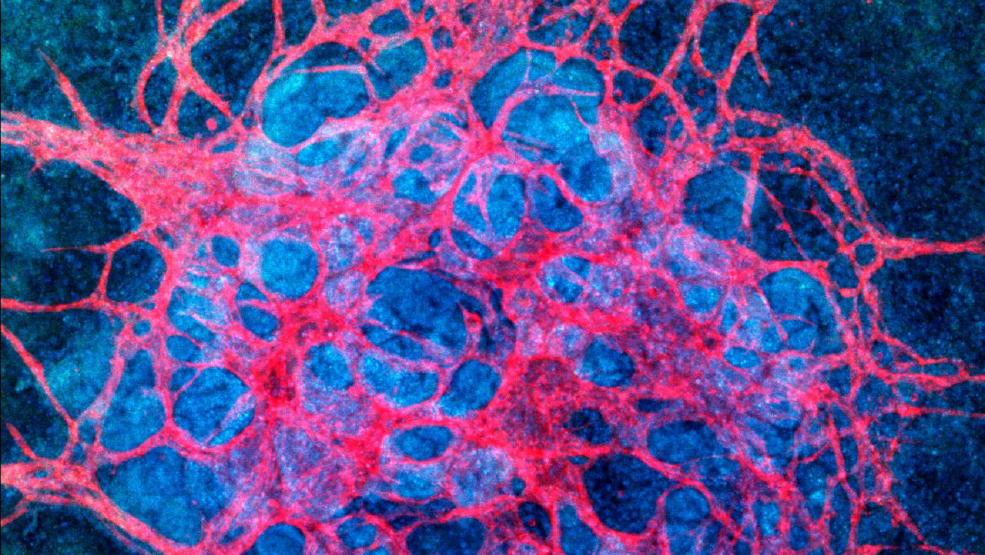Combination of 3D bioprinting and stem cell-based tissue engineering could enable new approaches to treating chronic kidney disease

A newly launched startup is building on innovations developed over several years at the Wyss Institute for Biologically Inspired Engineering at Harvard University, Harvard John A. Paulson School of Engineering & Applied Sciences (SEAS), and Brigham and Women’s Hospital (Brigham). San Diego-based Trestle Biotherapeutics has been granted a license by Harvard’s Office of Technology Development (OTD) to commercialize a suite of stem cell- and 3D bioprinting-based kidney regenerative medicine technologies.
The lack of transplantable kidney tissues and whole organs is a major challenge in the treatment of chronic and end-stage kidney disease. As of 2021, in the U.S. alone, there are more than 550,000 dialysis-dependent patients and 100,000 patients waiting for kidney transplants, yet only about 20,000 transplants are performed each year, with nearly 5,000 patients on waiting lists dying each year without receiving a transplant. Beyond kidney failure, there are more than 60 genetic diseases that directly or indirectly affect renal function, many of which cannot be appropriately treated with existing therapeutics.
The foundational technology was pioneered by researchers in the lab of Jennifer Lewis, who is a Wyss Core Faculty member, the Hansjörg Wyss Professor of Biologically Inspired Engineering at SEAS, and a Principal Faculty member at the Harvard Stem Cell Institute (HSCI). Lewis’ lab has collaborated with several clinicians, including Ryuji Morizane, who is an assistant professor at Massachusetts General Hospital, an HSCI Affiliate Faculty member, and a Visiting Scholar at the Wyss, as well as Joseph Bonventre, an HSCI Executive Committee member at the Brigham.
“We’re very excited to bring the biofabrication and stem cell biology technologies developed in the Lewis and Morizane labs into what we are building at Trestle. The teams at Harvard, Wyss, and the Brigham have a renowned track record in translational innovation, and we’re thrilled with the opportunity to carry their work forward for patients’ benefit,” said Ben Shepherd, the CEO of Trestle.
“More than a dozen members of my lab contributed to the innovations in tissue engineering that have created this technology platform,” said Lewis. “Most recently, we developed a new biomanufacturing method, known as sacrificial writing in functional tissue (SWIFT), that enables the fabrication of vascularized kidney tissues. I’m pleased that Trestle has now launched to translate this robust technology to address the growing need for kidney tissues and organs.”
Supported in part by Harvard OTD’s Physical Sciences & Engineering Accelerator, and later by the Wyss Institute’s Organ Engineering Initiative, Lewis and her colleagues at the Wyss and SEAS made seminal contributions to the field of multi-material 3D bioprinting. Using their platform technology, Lewis and her collaborators have created 3D kidney-on-chip models for drug screening and disease modeling, which led to foundational technology for rapidly generating vascularized kidney tissue at scale for repair and regeneration.
Central to the success of this approach was a collaboration between the Lewis Lab and researchers at the Brigham. Morizane, Bonventre, and other clinicians had developed a method for generating kidney organoids from human pluripotent stem cells in vitro. These tissue constructs contained large numbers of well-organized nephrons, but lacked a vascular network that could be perfused with blood. This deficiency was overcome by subjecting the organoids to the flow of fluids on bioengineered devices. In a collaborative effort published in the journal Nature Methods, the joint team succeeded in generating vascularized kidney organoids with enhanced nephron maturation in vitro.
“We were able to demonstrate for the first time a more advanced kidney architecture and functionality in human kidney organoids, which is important for creating tissue segments for use in drug testing and disease modeling and, ultimately, in vivo therapeutics,” said Morizane. Lewis and Morizane are members of Trestle Biotherapeutics’ scientific advisory board.
By combining these approaches with additional solutions for cell and tissue manufacturing, internal expertise in stem cell and kidney organoid biology, and the commercialization of 3D bioprinted human tissues, the team at Trestle will work towards its goal of creating a bioengineered kidney tissue that can fully perform vital kidney functions.
Read more
This story is adapted from a news release written by Benjamin Boettner and originally published on the Wyss Institute website on February 22, 2022.
